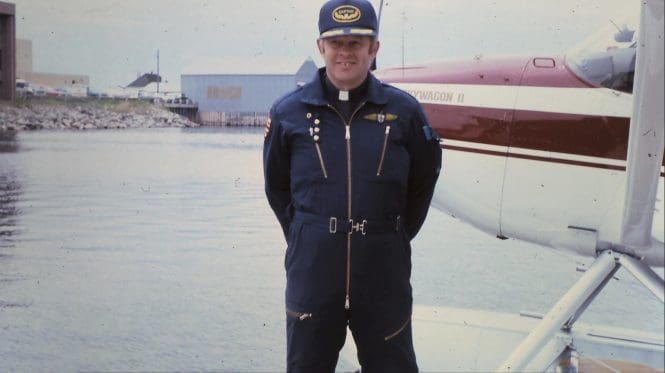Published September 6, 2023 in Anglican Journal. Written by Sean Frankling.
A proposed settlement for abuse committed by former Anglican priest and scouts volunteer Ralph Rowe, reached earlier this summer could total up to $13.25 million according to a copy of the settlement agreement posted on the website of Koskie Minsky LLP, the law firm representing the plaintiffs.
The settlement has been approved by the plaintiff’s representatives, by Scouts Canada and by the Anglican diocese of Keewatin as of Aug. 7, but must still be examined and approved by a judge in a hearing set for Oct. 27. It also stipulates that “General Synod shall engage in a consultation process with the impacted Indigenous communities and arrive at a mutually acceptable apology process,” with Scouts Canada providing a written apology to anyone requesting it as part of the claims process.
Rowe was convicted of nearly 60 sexual offences against Indigenous boys across the diocese of Keewatin in the 1970s and 1980s, though a 2015 documentary estimated he may have abused as many as 500 boys.
The settlement is the result of mediation between Scouts Canada, the diocese of Keewatin and the representatives of the plaintiffs in the class-action lawsuit against the two organizations for their failure to prevent or put a stop to Rowe’s misconduct sooner. Previously, the diocese of Keewatin and Scouts Canada accepted shared liability for their failure to stop Rowe’s abuse.
The actual diocese of Keewatin is now defunct and currently exists only as a corporation of four people for the purposes of completing the settlement of this lawsuit, after which it will be dissolved.
It’s currently expected that the Anglican Church of Canada and Scouts Canada will each pay half the cost, said Karen Webb, chancellor of the ecclesiastical province of Rupert’s Land and one of the four members of the on-paper-only diocese of Keewatin. Webb is also a member of the Anglican Journal’s editorial board.
Indigenous and non-Indigenous leaders have been calling on the church to apologize for Rowe’s actions for years. Alvin Fiddler, former grand chief of Nishnawbe Aski Nation, where much of Rowe’s abuse took place, called for an apology after the suicides of two 12-year-old girls in Wapekeka First Nation, Ont. in January 2017. Carolyn Bennett, then Indigenous Affairs minister, made a similar call for an apology.
The same month, Archbishop Fred Hiltz, then primate of the Anglican Church of Canada, said he intended to make a public apology, but would need to consult first with Lydia Mamakwa, bishop of the Indigenous Spiritual Ministry of Mishamikoweesh, formed in 2014 from the northern region of the diocese of Keewatin.The class-action lawsuit was launched a few months later.
Neither Mamakwa nor Morris Fiddler, suffragan bishop for Northern Ontario in Mishamkikoweesh, replied to requests from the Anglican Journal for comment on the proposed settlement.
In a news release, Koskie Minsky partner Jonathan Ptak described Rowe as “one of the worst and most prolific abusers in the history of this country.”
Ptak continued, “His abuse was devastating to Indigenous communities in northern Ontario and eastern Manitoba. If approved, the settlement will provide real compensation to survivors of abuse committed by Rowe through a trauma-informed and sensitive claims process.”
According to the settlement document, that process will offer two tracks for survivors to seek compensation. They may go through a simplified claims process, through which they could be eligible for between $30,000 and $140,000 depending on the extent and nature of the harm they suffered from Rowe’s abuse. They may also choose to go through a more onerous claims process, which includes cross-examination by a lawyer representing the defendants intended to verify the extent of the psychological and employment consequences resulting from Rowe’s misconduct. In the latter case, they may be eligible for up to an additional $210,000 on top of what they received through the simplified process.
Webb said she would not be able to comment on the significance of the settlement until after it was finalized, though she was willing to comment on her shock when she originally heard about the extent of Rowe’s crimes in the 1990s.
“I remember—because I’ve been an Anglican my whole life—going, ‘Well, geez, how the hell did this happen?’” she said. “I see no way anyone could possibly find any excuse for what he did.”
Members of the class covered by the lawsuit—survivors of Rowe’s abuse—are eligible to attend the Oct. 27 approval hearing and to enter testimony in support of or in objection to the proposed settlement.


Leave a Reply